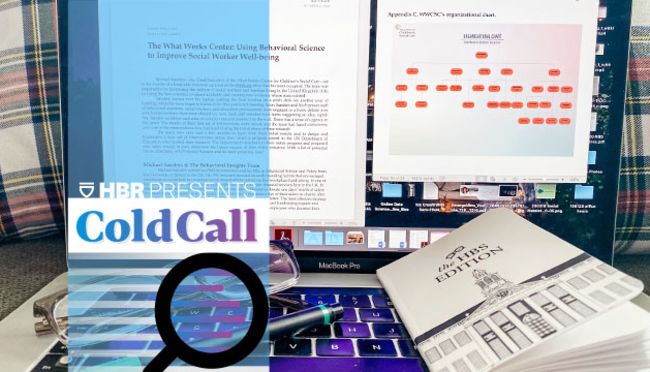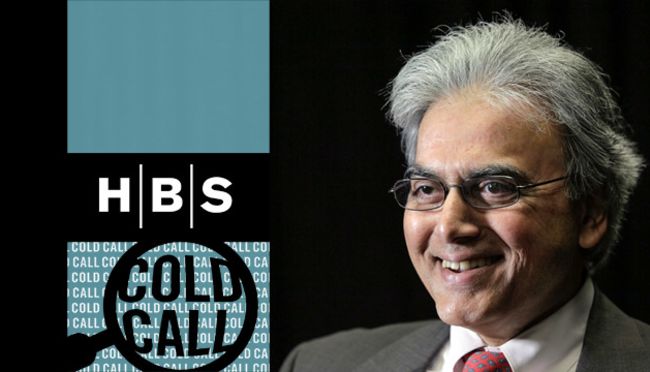Nonprofit Organizations →
→

- 25 Apr 2023
- Cold Call Podcast
Using Design Thinking to Invent a Low-Cost Prosthesis for Land Mine Victims
Bhagwan Mahaveer Viklang Sahayata Samiti (BMVSS) is an Indian nonprofit famous for creating low-cost prosthetics, like the Jaipur Foot and the Stanford-Jaipur Knee. Known for its patient-centric culture and its focus on innovation, BMVSS has assisted more than one million people, including many land mine survivors. How can founder D.R. Mehta devise a strategy that will ensure the financial sustainability of BMVSS while sustaining its human impact well into the future? Harvard Business School Dean Srikant Datar discusses the importance of design thinking in ensuring a culture of innovation in his case, “BMVSS: Changing Lives, One Jaipur Limb at a Time.”

- 03 Jan 2023
- What Do You Think?
How Would the Leadership Style of Girl Scouts' Frances Hesselbein Fare Today?
Frances Hesselbein's mission-driven leadership helped shift the nonprofit's image, and expand and diversify its membership. James Heskett reflects on the late executive director's reputation for storytelling and change management. Would her tactics work today? Open for comment; 0 Comments.

- 15 Aug 2022
- Book
University of the Future: Finding the Next World Leaders in Higher Ed
Which universities will step into the void as American colleges decline? In the book Empires of Ideas, William Kirby explores how the history of higher education in the US, China, and Germany might shape its future.

- 07 Jun 2021
- Book
9 Tips from an Expert Fundraiser: Help Donors 'Invest in Their Passion'
Seeking donations can feel like begging. In this excerpt from Effective Fundraising, F. Warren McFarlan offers advice to help trustees approach prospective donors with confidence. Open for comment; 0 Comments.

- 02 Feb 2021
- Working Paper Summaries
Nonprofits in Good Times and Bad Times
Tax returns from millions of US nonprofits reveal that charities do not expand during bad times, when need is the greatest. Although they are able to smooth the swings of their activities more than for-profit organizations, nonprofits exhibit substantial sensitivity to economic cycles.

- 05 Jan 2021
- Cold Call Podcast
Using Behavioral Science to Improve Well-Being for Social Workers
For child and family social workers, coping with the hardships of children and parents is part of the job. But that can cause a lot of stress. Is it possible for financially constrained organizations to improve social workers’ well-being using non-cash rewards, recognition, and other strategies from behavioral science? Assistant Professor Ashley Whillans describes the experience of Chief Executive Michael Sanders’ at the UK’s What Works Centre for Children’s Social Care, as he led a research program aimed at improving the morale of social workers in her case, “The What Works Centre: Using Behavioral Science to Improve Social Worker Well-being.” Open for comment; 0 Comments.

- 14 Dec 2020
- Working Paper Summaries
Nonprofit Boards: It is Time to Lift Your Gaze and See the System
Not every organization should attempt to solve problems at a system level, but can become more aware of systemic issues, ensuring that solutions dovetail into the macrosystem for best collective impact.

- 26 May 2020
- Cold Call Podcast
Can the ‘Cummings Way’ Live On after the Founder Retires?
After 50 years at the helm of Cummings Properties, billionaire and philanthropist Bill Cummings is contemplating retirement. Christina R. Wing and Cummings discuss what's next for both the family business and foundation that he built. Open for comment; 0 Comments.

- 08 May 2020
- In Practice
Nonprofits Hurt by COVID-19 Must Hoard Cash to Hold On
Experts from Harvard Business School's Social Enterprise Initiative offer advice to nonprofits struggling to survive the coronavirus pandemic. Open for comment; 0 Comments.

- 28 Jun 2018
- Cold Call Podcast
L.A. Philharmonic Shows the American Symphony Orchestra Isn’t Dead Yet
Like many American symphony orchestras, the Los Angeles Philharmonic seemed dying on the vine, unable to attract younger audiences or new sponsors. Then new CEO Deborah Borda came aboard with a plan to revive the brand. Rohit Deshpande discusses his case study on the turnaround. Open for comment; 0 Comments.

- 19 Oct 2017
- Research & Ideas
How Charitable Organizations Can Thwart Excuses for Not Giving
Charitable organizations provide all kinds of reasons for donors to give money—but sometimes their messaging does just the opposite, shows research by Christine Exley. Open for comment; 0 Comments.

- 24 Jul 2017
- Research & Ideas
People Have an Irrational Need to Complete 'Sets' of Things
People are irrationally motivated to complete arbitrary sets of tasks, donations, or purchases—and organizations can take advantage of that, according to new research by Kate Barasz, Leslie John, Elizabeth Keenan, and Michael Norton. Open for comment; 0 Comments.

- 15 Jan 2016
- Working Paper Summaries
Incentives for Prosocial Behavior: The Role of Reputations
This study documents how small monetary incentives discourage volunteering when they are public and thus introduce a “greedy” signal. The discouragement from this greedy signal, however, is less pronounced among volunteers with public reputations, or those who are likely known not to be too greedy.

- 21 Dec 2015
- Working Paper Summaries
Wage Elasticities in Working and Volunteering: The Role of Reference Points in a Laboratory Study
Nonprofit organizations often rely on reference points—explicit or implicit targets and goals—to encourage more effort from volunteers. This study finds that effort does tend to cluster around reference levels, so this may be perceived as a very effective strategy. Yet reference levels can potentially backfire: in response to higher volunteer wages or productivity, volunteers may reduce their effort so as to meet the reference level.
- 01 Dec 2015
- Research & Ideas
What to Do When Your Organization Has Dueling Missions
It’s no easy feat to manage hybrid organizations, which combine the social mission of a nonprofit with the revenue model of a for-profit business. Julie Battilana and colleagues explain how hybrids can find success with a business model dubbed “spaces of negotiation.” Open for comment; 0 Comments.
- 30 Nov 2015
- Research & Ideas
Donors Are Turned Off by Overhead Costs. Here’s What Charities Can Do
Elizabeth A. Keenan and colleagues find that charitable donors are willing to stomach the idea of overhead costs—as long as they know someone else’s donation is covering them. A field study helped one organization nearly triple its solicited donations. Open for comment; 0 Comments.

- 04 Nov 2015
- Working Paper Summaries
Do People Who Care About Others Cooperate More? Experimental Evidence from Relative Incentive Pay
This paper explores how the degree to which individuals care about other workers affects their own performance when faced with relative performance pay.
- 20 Aug 2014
- Research & Ideas
Why the ALS Ice Bucket Challenge is a Social Media Blockbuster
Most companies should envy the financial and brand awareness brought about by the ALS Ice Bucket Challenge. The campaign's key ingredient, says John Deighton, is that participants enhance their personal capital in performance of a good deed. Open for comment; 0 Comments.

- 03 Sep 2013
- Working Paper Summaries
How the Zebra Got Its Stripes: Imprinting of Individuals and Hybrid Social Ventures
Creating hybrid organizations that combine existing organizational forms is a complex process. Given the legitimacy challenges facing hybrid organizations, why are they created in the first place? The authors focus on the role of "environmental imprinting" on individuals: this means the persistent effects that individuals' environments during sensitive periods have on their subsequent behaviors. After constructing and analyzing a novel dataset of over 700 founders of social ventures, all guided by a social welfare logic, the authors suggest that individual imprinting helps to explain why an entrepreneur founding a social venture might create a hybrid by incorporating a secondary, commercial logic. Overall, the paper contributes to the understanding of hybrid organizations by providing the first large-scale, empirical examination of the antecedents of the widely-discussed type of hybrids that combine social welfare and commercial logics. Key concepts include: Environmental imprinting refers to the effects that characteristics of individuals' environments during sensitive periods have on their subsequent behaviors. Entrepreneurs' direct exposure to various work environments through their own experience influences their likelihood to create a new hybrid venture. The findings contribute to institutional theory more generally by showing how environmental imprints on individuals may enable divergence from current, institutionalized structures, as well as how the contours of such imprints may vary with characteristics such as tenure and type of exposure. Closed for comment; 0 Comments.

Why Giving to Others Makes Us Happy
Giving to others is also good for the giver. A research paper by Ashley Whillans and colleagues identifies three circumstances in which spending money on other people can boost happiness.